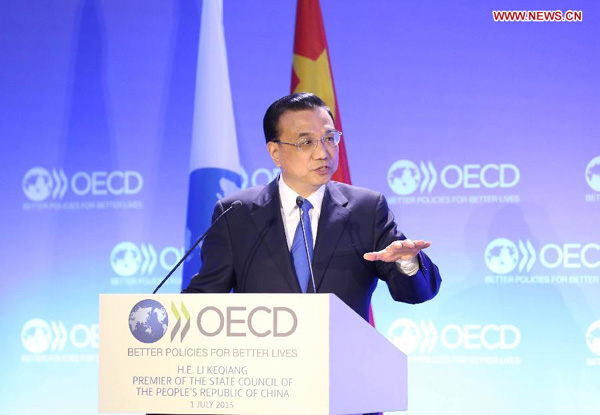China, OECD eye closer partnership
(Xinhua) Updated: 2015-07-02 14:21PARIS - China and the Organization for Economic Cooperation and Development (OECD) on Wednesday agreed to strengthen cooperation in areas ranging from macroeconomic management to green growth and beef up their two-decade-old partnership.
|
 |
|
Chinese Premier Li Keqiang delivers a speech at the headquarters of the Organization for Economic Cooperation and Development (OECD) in Paris, France, July 1, 2015. [Photo/Xinhua] |
The world's second largest economy and the Paris-based organization reached the consensus during Chinese Premier Li Keqiang's visit to the OECD headquarters, where they signed a shared vision statement and a 2015-2016 joint work program.
Also on Wednesday, China officially joined the OECD development center, a forum where countries share their experience in economic and social policy-making to help decision-makers work out measures to boost growth in developing countries and emerging economies.
OECD Secretary-General Jose Angel Gurria hailed China's entry as a "historic and transformative opportunity for mutually beneficial knowledge-sharing."
In a speech delivered at the OECD headquarters, Li stressed the importance of developing the real economy against the backdrop of the global economy's slow recovery and speeding up structural reform.
"To my understanding, the most important structural reform is to inspire people's interactivity and creativity to maintain a vigorous economic growth," he told the 500-odd audience.
That is why the Chinese government is taking various steps to create an amicable environment for mass innovation and entrepreneurship to power growth and create jobs, added the premier.
Recognizing that the policy of quantitative easing is indispensable to prevent the world economy from plunging into recession, he pointed out that the approach alone is by no means enough to prompt a strong recovery.
He called for more international cooperation in production capacity, which involves bringing in facilities, equipment, technology and management expertise from other countries to effectively reduce construction costs, create jobs for local communities and promote development of domestic industries.
China, he added, is ready to carry out tripartite cooperation with a view to combining the manufacturing advantages of his country with the advanced technologies of developed countries and the huge development needs of developing countries.
"That will benefit all the three sides," Li said.




